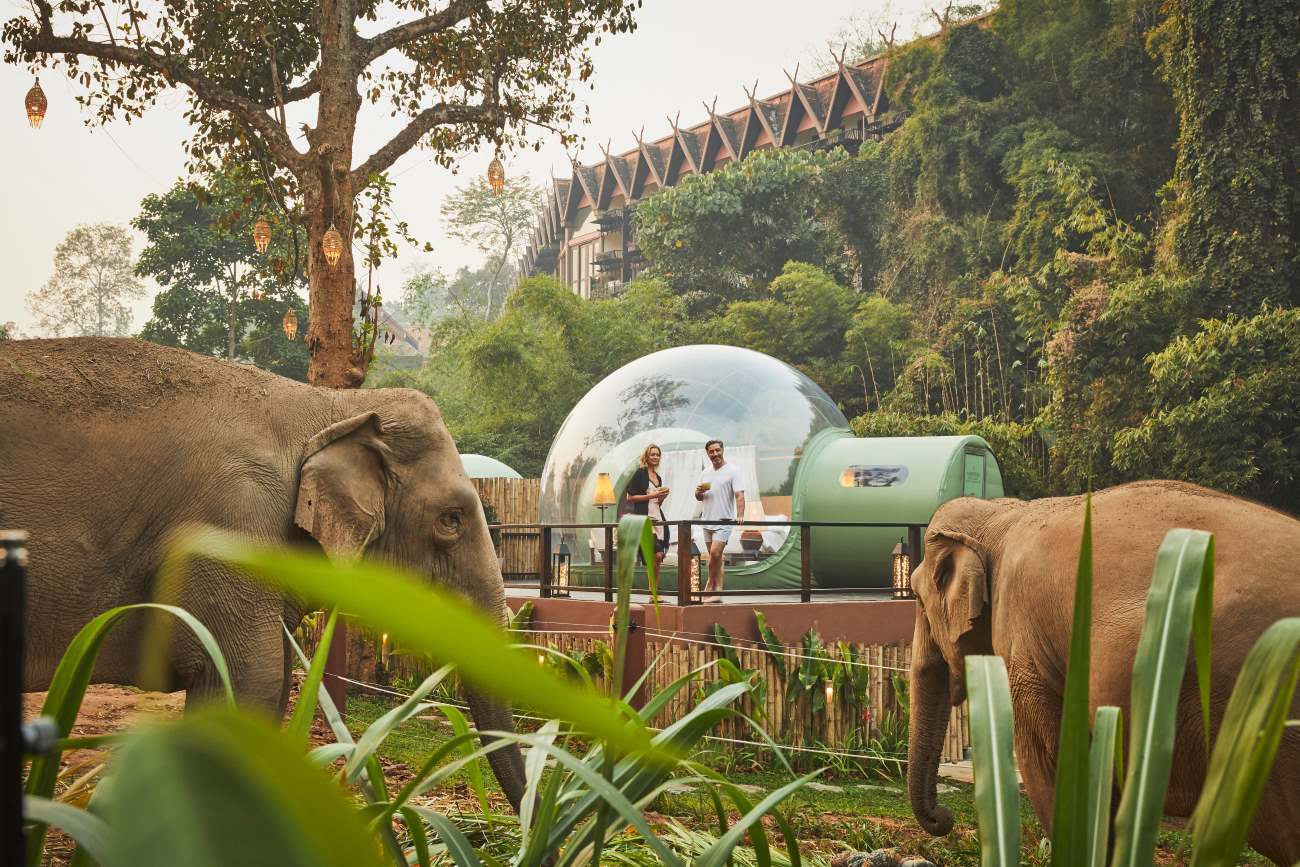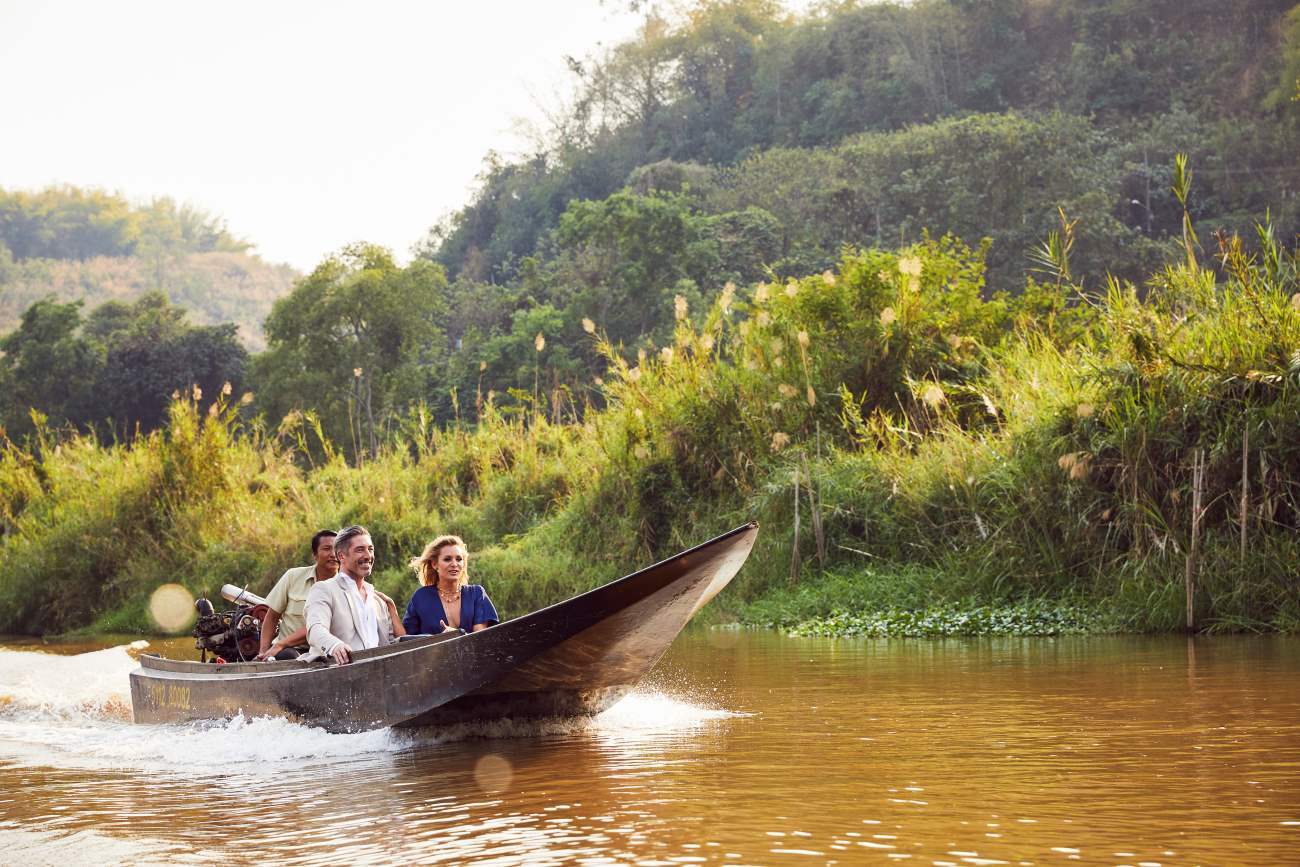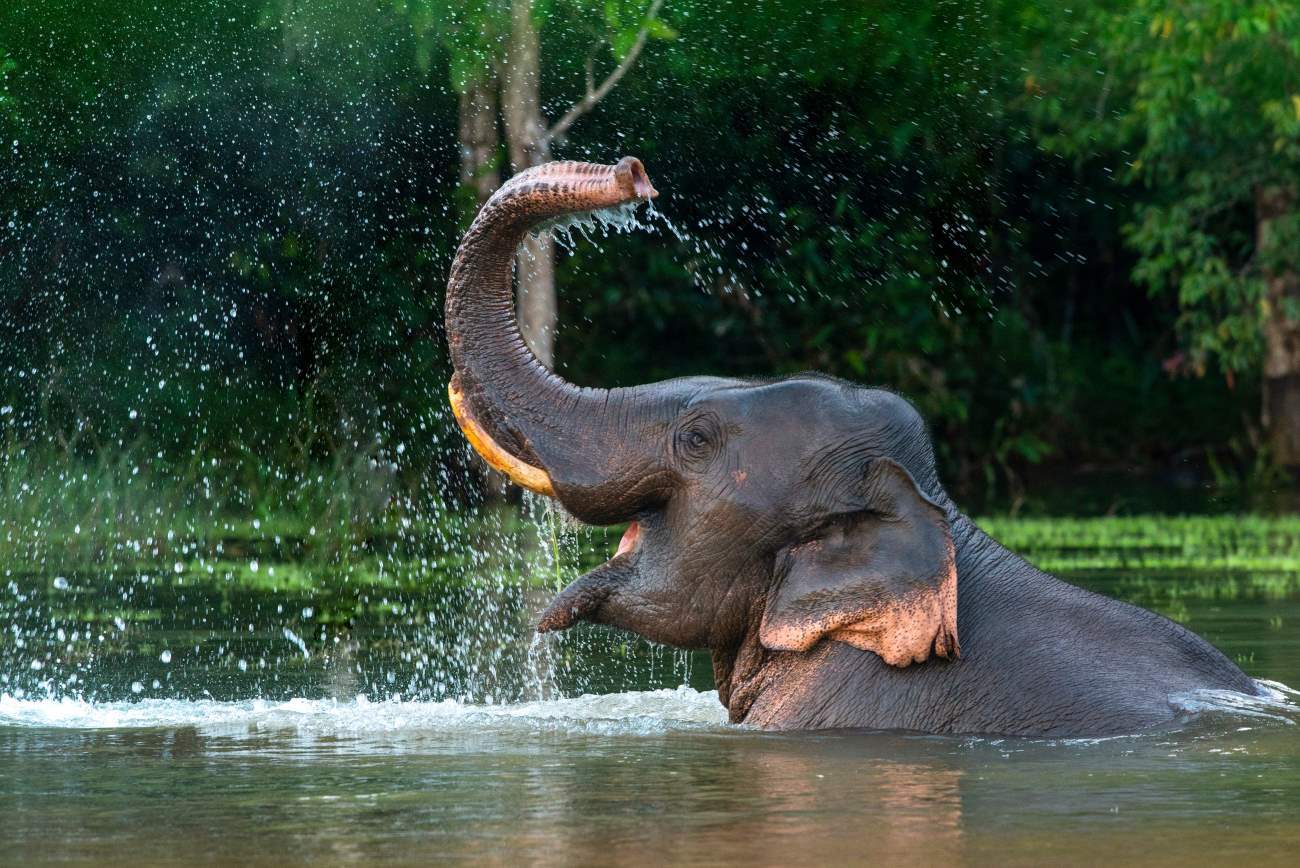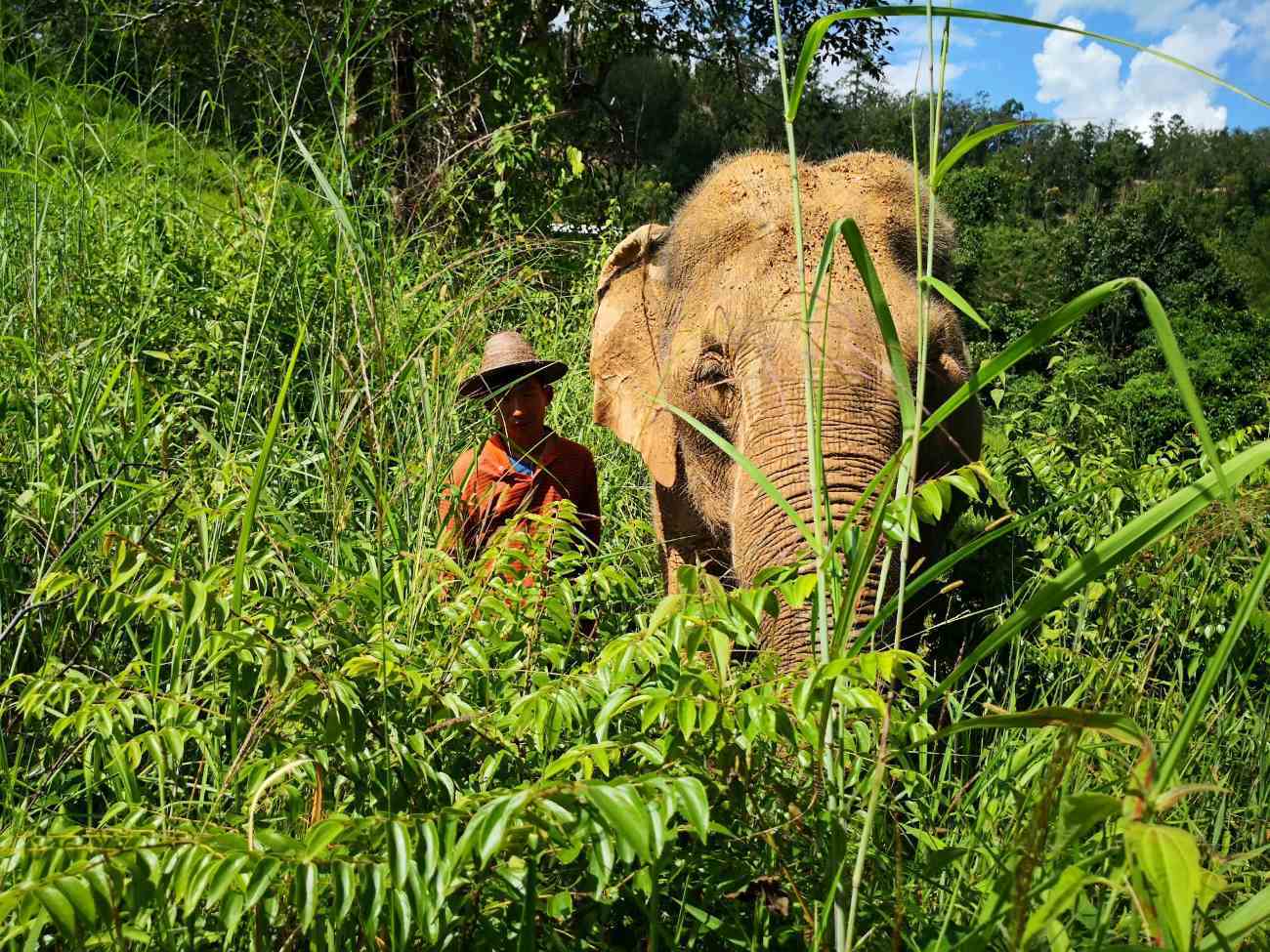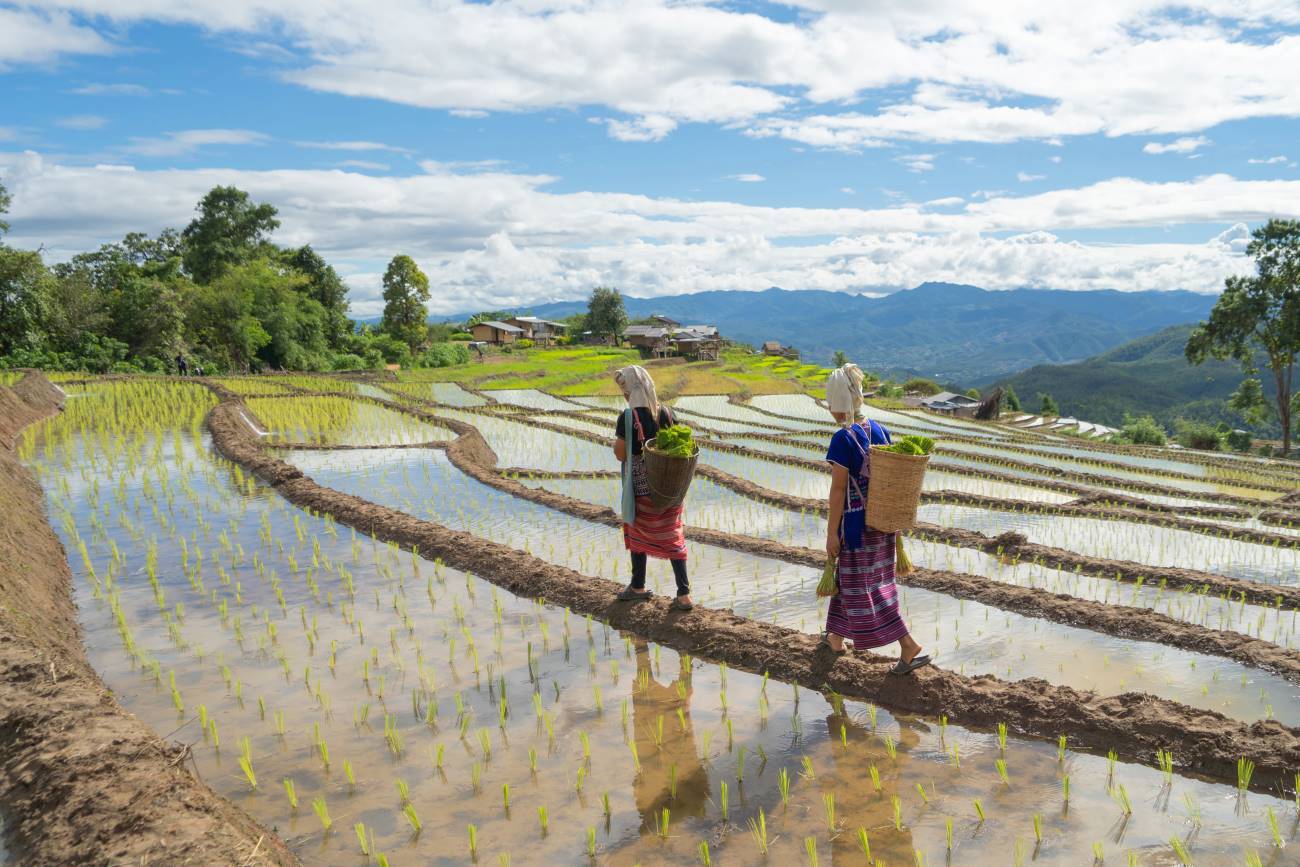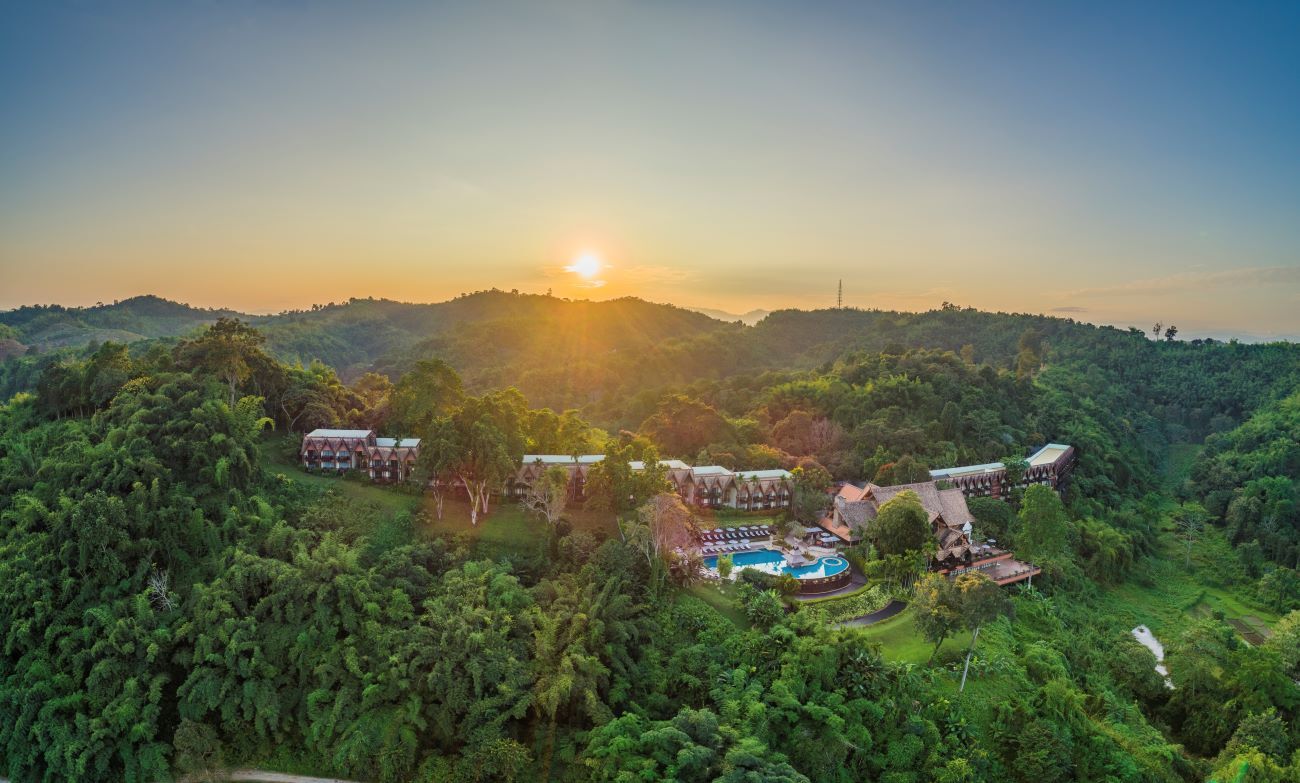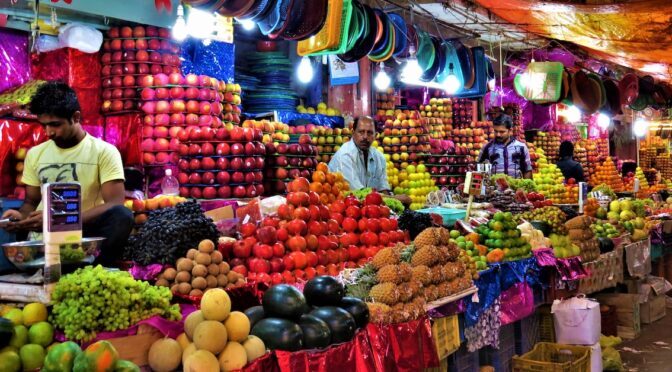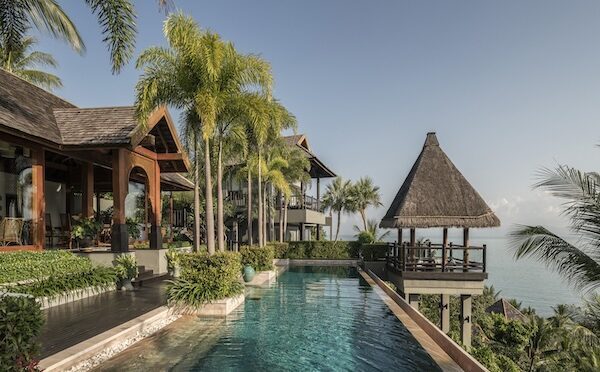Ethical experiences: How the tide is turning for Thailand's long-exploited elephants
A captivating journey across northern Thailand showcases what’s being done to protect these animals
I follow my guide, Choo, through the dense cloud forest of northern Thailand, which hums with insects, drips with bromeliads and is roamed by wild monkeys and deer, while cobalt-blue butterflies dance through the canopy and a golden temple glistens from a distant peak above. Pausing on a steep mountain slope, Choo puts a silencing finger to her lips, indicating we’re close to the animals we’ve come to see: Asian elephants. Ahead of us, local mahouts from the non-profit Mahouts Elephant Foundation crouch on the trail, as a large mother and baby approach, their probing trunks investigating the mahouts’ boots, caps and bags. Rescued from the tourism industry, seeking food from humans is an unnatural learnt behaviour and one that is now being discouraged – with love – by the foundation, which is on a mission to see Thailand’s elephants living wild and free. The cause works in partnership with the country’s Indigenous Karen hill tribes to develop community‑based tourism models for observation‑only elephant encounters. The projects are in vast areas of forest, enabling the animals to live naturally, while tourists watch from a safe and respectful distance with local mahout guides (traditionally, a mahout is an elephant’s carer, responsible for tending to the needs of domesticated elephants).
Ethical approach
Guests on Mahouts’ four‑day Mountain Adventure have the option to stay with families in a traditional Karen village or at a private lodge, with meals taken in local homes, and the chance to learn textile and basket‑weaving skills. Bookings support the foundation, which is fundraising to save six more elephants from entering the tourism industry. “We work closely with the local community to offer visitors an authentic, immersive Thai experience that benefits people and elephants,” explains Mahouts’ co‑founder and chief executive, Sarah Blaine. “The Karen people own more elephants than any other group in Thailand, and community‑based tourism is a fantastic way to support them. Our hands‑off, observational approach with the elephants ensures they can continue to live in the forest and express their natural behaviours.” Asia specialist tour operator Experience Travel Group creates bespoke trips to Thailand and beyond, with an emphasis on supporting local, sustainable and responsible resorts and businesses, including Mahouts Elephant Foundation. On my two‑week tailored trip, I experience three elephant encounters with properties and organisations working hard to redefine how tourists interact with elephants that have been rescued from the logging and entertainment industries. “In the past – and still seen in a few places – very dubious practices involving elephants were carried out for profit, and supporting these poorly managed experiences could encourage more elephants to be mistreated, taken into captivity or used for breeding,” explains the tour operator’s co‑founder and managing director, Sam Clark. “But in recent years, the tourist demand for high‑quality and ethical practices has driven an improvement in conditions at a majority of camps in Thailand.”
Roaming free
Located in the breathtaking hill country outside Chiang Mai, ChangChill lays claim to having been the first truly elephant-friendly venue in northern Thailand, offering observation‑only experiences that meet the stringent criteria set by global animal welfare organisation World Animal Protection. “The elephants roam free around the property: they live well and eat well,” says the camp’s chief mahout, Chira Pongpathapee. “When I was young, I always saw elephants working hard logging or carrying tourists, but now they live in a different world. Here, they are happy.” Unlike the exploitative elephant circus shows and experiences that are still sadly on offer in other parts of the country, in the three‑hectare forest at ChangChill, there’s no riding or touching, and the sharp bull hooks, traditionally used by mahouts to exert control over their animals, are nowhere to be seen. Instead, on our pre-booked day visit, we observe elephants foraging in the forest from 10 to 15 metres away; chop sugar cane, which they eat while we watch respectfully from an observation deck; and join a cookery class to make energy balls of banana, tamarind, rice husks and medicinal herbs, which are fed to the elephants by their mahouts, rather than us, to minimise contact and stress. “ChangChill is thriving, and serves as an example of an elephant-friendly business model that not only improves elephant welfare, but also ensures the sustainability of the business and livelihoods of the local people involved,” says Hatai Limprayoonyong, wildlife campaign manager at World Animal Protection.
Pick wisely
According to national parks data, there are between 4,000 and 4,400 wild elephants in Thailand, mainly living across 91 protected areas, including wildlife sanctuaries, non-hunting zones, national parks and forest parks. The latest data from World Animal Protection’s 2020 Taken for a Ride 2 report found there were 2,800 captive elephants being kept across 246 ‘tourism camps’. When the Thai government banned the use of elephants for logging in forests in 1989, thousands of the mammals’ owners – largely members of the Karen Indigenous communities, who live in the hills to the north of the country – suddenly became jobless. Desperate to find new ways to pay for their elephants’ keep, most of them transitioned into tourism. “Tourists pay to visit commercialised elephant camps, which are designed as entertainment attractions,” explains Limprayoonyong. “Here, they can pet, feed, ride, wash and take photographs of elephants, or watch them perform tricks in circus-like shows. Unfortunately, almost all of these elephants experience cruelty and poor welfare conditions at these venues.” Anantara Golden Triangle Elephant Camp & Resort (see box), a luxurious mountain retreat near Chiang Rai on the border with Laos and Myanmar, works with the non-profit Golden Triangle Asian Elephant Foundation. It is home to 20 rescued elephants, which roam the property’s 65-hectare bamboo forest, offering guests a range of unique, low-impact and meaningful interactions. Visitors can learn about the historical and cultural relationship between elephants and mahouts, discover more about the animals from the resident vet, walk with them through Anantara’s beautiful gardens, watch them bathe and even observe them by night via the resort’s exciting ‘Jungle Bubble’ experience. “Responsible tourism can have really positive benefits for Thailand’s elephants,” says Experience Travel Group’s Sam Clark. “As we saw during the pandemic, elephants can suffer badly without tourist revenues to support them and their upkeep. “Doing your research on the experience, booking with a reputable tour operator and asking questions is essential, and will help to ensure the lives of these incredible animals continue to improve in the future.”
Review: Anantara Golden Triangle Elephant Camp & Resort
You’ll discover a special blend of luxury and adventure at Anantara Golden Triangle. Rising discreetly from a forested ridge in the jungle, an hour’s drive from Chiang Rai in northern Thailand, Anantara offers intimate elephant encounters along with unique overnight and culinary experiences. Overlooking the Mekong on the border with Laos and Myanmar, this spectacular mountain sanctuary is surrounded by bamboo forest and gardens, where you can responsibly walk with elephants rescued from the logging and entertainment industries, and dine high in the sky with Anantara’s new Canopy Tree Top Dining Experience. Elephant and Buddha statues evoke a sense of calm as soon as you arrive, and the zen ambience extends to the Samsarn restaurant, which serves Thai, Laotian and Burmese cuisine; the Lanna Resort spa; and the Elephant Bar and Opium Terrace, which overlooks the large, tranquil infinity pool. Rooms and suites are decorated with Asian art and textiles, and furnished with explorer-style desks, complete with binoculars for spotting birds and elephants in the forest. And for the ultimate sleepover, spend a night in one of Anantara’s Jungle Bubbles: transparent, domed en-suite bedrooms, with private decks for observing the elephants munching on bamboo before they settle down to slumber – just a stone’s throw from your door.
Book it: Experience Travel Group offers a two-week tailor-made trip, including two nights at Anantara Golden Triangle Elephant Camp & Resort near Chiang Rai, two nights at The Tubkaak Boutique Resort in Krabi, three nights at Tamarind Village in Chiang Mai and three nights at Mahouts Elephant Foundation near Mae Sot, from £5,950 per person. The price is based on two people travelling and includes B&B, transport, activities and international flights.
experiencetravelgroup.com
